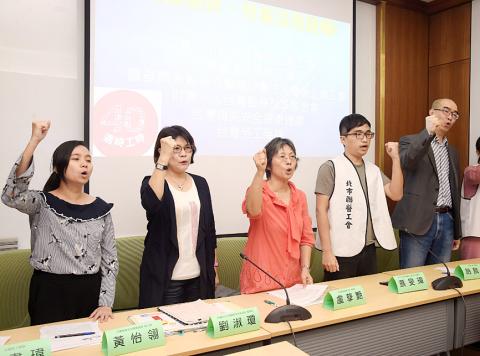Several medical labor rights groups yesterday urged the government not to amend the Labor Standards Act (勞動基準法) again, saying the law in its current form protects healthcare workers from overwork.
Original amendments to the act, promulgated on Dec. 23 last year, require that employees be given at least one fixed day off per week and at least 11 hours of rest time between shifts.
However, the Cabinet last week proposed conditionally easing the “one fixed day off and one flexible rest day” rule by allowing workers in certain industries to have two fixed days off every two weeks and at least eight hours of rest time between shifts in “exceptional circumstances,” which must be approved by a competent authority.

Photo: Huang Yao-cheng, Taipei Times
Lawmakers across party lines have expressed concern over the proposed changes, with some saying that exceptional circumstances might become the norm and that workers might be forced to work for 12 consecutive days before taking two days off.
Representatives from the Taiwan Healthcare Reform Foundation, Taiwan Nurses’ Union, Taipei City Hospital Labor Union, Chiayi Christian Hospital Labor Union, and Taiwan Occupational Safety and Health Link called on the Cabinet to withdraw the proposed amendment.
The “one fixed day off and one flexible rest day” policy has gradually improved healthcare workers’ labor conditions, but now the government wants to amend the act again to satisfy employers, they said at the Legislative Yuan.
Healthcare workers are already overworked and the proposed amendment would only make their working conditions worse, they said, adding that without sufficient rest, workers are likely to provide low-quality treatment and care.
“A possible scenario is that a burnt-out worker who works 40 hours per week gets sick and is treated by healthcare practitioners who work 80 hours per week,” federation chief executive Joanne Liu (劉淑瓊) said.
Overworked healthcare practitioners would be at greater risk of making mistakes, Liu added.
Although nurses are included in the act, hospitals often ignore the regulation and force nurses to work for long hours and irregular shifts that include sudden notices asking them to take compulsory leave, Taiwan Nurses’ Union chairwoman Lu Zxy-yann (盧孳豔) said.
While there about 260,000 licensed nurses in the nation, only about 160,000 work as nurses in healthcare facilities, she said.
Any amendments should be aimed at solving staffing problems rather than loosening the standards that protect nurses’ working conditions, she said.
Overall unionization rate in the nation is only about 6.3 percent and it is only about 0.5 percent at healthcare facilities, so it would be difficult for workers to negotiate with their employers for their rights, as there is a clear imbalance of power between employers and employees, Lu said.
Taipei City Hospital Labor Union chairman Tsai Min-chang (蔡旻璋) said that hospital management were forced to solve a staff shortage problem because of the “one fixed day off and one flexible rest day” policy, but the proposed amendment would “turn the clock back” and sacrifice the safety of healthcare workers and patients.

ANOTHER EMERGES: The CWA yesterday said this year’s fourth storm of the typhoon season had formed in the South China Sea, but was not expected to affect Taiwan Tropical Storm Gaemi has intensified slightly as it heads toward Taiwan, where it is expected to affect the country in the coming days, the Central Weather Administration (CWA) said yesterday. As of 8am yesterday, the 120km-radius storm was 800km southeast of Oluanpi (鵝鑾鼻), Taiwan’s southernmost tip, moving at 9kph northwest, the agency said. A sea warning for Gaemi could be issued tonight at the earliest, it said, adding that the storm is projected to be closest to Taiwan on Wednesday or Thursday. Gaemi’s potential effect on Taiwan remains unclear, as that would depend on its direction, radius and intensity, forecasters said. Former Weather Forecast

As COVID-19 cases in Japan have been increasing for 10 consecutive weeks, people should get vaccinated before visiting the nation, the Centers for Disease Control (CDC) said. The centers reported 773 hospitalizations and 124 deaths related to COVID-19 in Taiwan last week. CDC Epidemic Intelligence Center Director Guo Hung-wei (郭宏偉) on Tuesday said the number of weekly COVID-19 cases reported in Japan has been increasing since mid-May and surpassed 55,000 cases from July 8 to July 14. The average number of COVID-19 patients at Japan’s healthcare facilities that week was also 1.39 times that of the week before and KP.3 is the dominant

The Chinese Communist Party’s (CCP) working group for Taiwan-related policies is likely to be upgraded to a committee-level body, a report commissioned by the Mainland Affairs Council (MAC) said. As Chinese President Xi Jinping (習近平) is increasingly likely to upgrade the CCP’s Central Leading Group for Taiwan Affairs, Taiwanese authorities should prepare by researching Xi and the CCP, the report said. At the third plenary session of the 20th Central Committee of the CCP, which ended on Thursday last week, the party set a target of 2029 for the completion of some tasks, meaning that Xi is likely preparing to

US-CHINA TRADE DISPUTE: Despite Beijing’s offer of preferential treatment, the lure of China has dimmed as Taiwanese and international investors move out Japan and the US have become the favored destinations for Taiwanese graduates as China’s attraction has waned over the years, the Ministry of Labor said. According to the ministry’s latest income and employment advisory published this month, 3,215 Taiwanese university graduates from the class of 2020 went to Japan, surpassing for the first time the 2,881 graduates who went to China. A total of 2,300 graduates from the class of 2021 went to the US, compared with the 2,262 who went to China, the document showed. The trend continued for the class of 2023, of whom 1,460 went to Japan, 1,334 went to